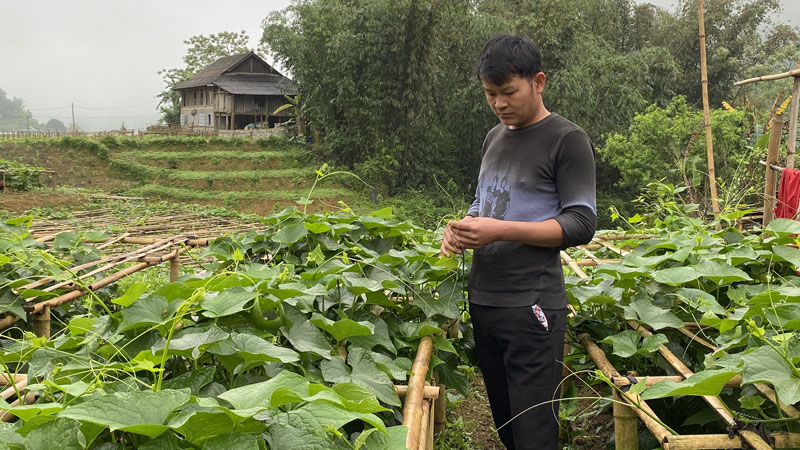
(HBO) - Taking advantage of its favourable soil and weather, Tan Lac district focuses on developing the cultivation of pomelo trees in low land areas along National Highway 12B and temperate vegetables in high land areas for improved economic benefits and living standards.
 Farmers in Tan Lac’s
Quyet Chien commune grow chayote for shoots and fruits, earning between 180 and
200 million VND per hectare.
Farmers in Tan Lac’s
Quyet Chien commune grow chayote for shoots and fruits, earning between 180 and
200 million VND per hectare.
The district has issued thematic resolutions to direct
locals to develop agricultural production in association with building
new-style rural areas. As a result, local communes and towns have switched from
rice to other crops with higher economic value on 2,500 hectares of land;
upgraded more than 670 hectares of gardens for the cultivation of pomelo trees,
watermelon, and peanut in low areas, and chayote and garlic in high areas,
among others.
Following the district Party Committee’s Resolution 10 on
promoting the cultivation of pomelo trees, the area under the citrus fruit has
expanded quickly. As of July 2020, the pomelo-cultivated areas hit 1,105 hectares,
with an average yield of 30 tonnes of fruit per ha. Each pomelo is sold for
20,000 VND, meaning a hectare of the fruit trees can reel in from 400 to 700
million VND. The fruit tree has become a key revenue earner for locals, many of
whom have invested in garden upgrade and intensive farming for better products
meeting increasing demand from the market.
In addition to pomelo, the district also prioritises
temperate vegetables, particularly chayote for its suitability for mountainous
communes’ soil and weather. The area under chayote is now around 90 hectares,
of which 65 hectares are in Quyet Chien.
Tan Lac pomelo and Quyet Chien chayote are popular
nationwide. The district has decided not to expand the plantation areas but
focusing on boosting productivity, quality, and safety.
The pomelo has been recognized as meeting the standard of
the One Commune One Product (OCOP) programme last year, while application for
provincial recognition of the chayote is pending./.
The Standing Board of the Hoa Binh provincial Party Committee has agreed in principle on a proposal by the Standing Board of the Party Committee of Hoa Binh city to gather feedback on the city’s 1:2000 zoning plan, which forms part of its broader urban development strategy.
Hoa Binh province has made notable progress in public administration reform and digital government development, with the satisfaction index among citizens and businesses reaching over 84%, according to recent government evaluations.
Thanks to great efforts by local authorities in recent times, the governance and public administration performance of Mai Chau district has been significantly improved.
In the afternoon of June 6, the Party Committee, the People's Council, the People's Committee and the Fatherland Front of Lac Son district solemnly held a meeting to celebrate the 139th anniversary of the district's founding (1886–2025) and the 79th anniversary of the establishment of the district's Party Committee (1946–2025). There was the attendance of Mr. Bui Van Thang, the Vice Chairman of the Provincial People's Council; Mr. Quach Tat Liem, the Vice Chairman of the Provincial People's Committee; Ms. Dang Bich Ngoc, the Deputy Head of the National Assembly Delegation of the province; as well as the former leaders of the province and district through various periods, who are the natives of the district.
Implementing the Politburo’s Resolution No. 57-NQ/TW on breakthroughs in science – technology, innovation, and digital transformation is a golden opportunity for the northern mountainous province of Hoa Binh to renew growth model, improve competitive edge and shorten digital gap.
Resolution 57-NQ/TW, issued by the Politburo on December 22, 2024, identifies sci-tech, innovation, and digital transformation as strategic breakthroughs to build a developed and prosperous nation. In Hoa Binh province, this spirit is not just a slogan, it’s being put into action through concrete initiatives that form a "new development triangle”: digital citizenship, digital economy, and digital administration.



 Farmers in Tan Lac’s
Quyet Chien commune grow chayote for shoots and fruits, earning between 180 and
200 million VND per hectare.
Farmers in Tan Lac’s
Quyet Chien commune grow chayote for shoots and fruits, earning between 180 and
200 million VND per hectare.